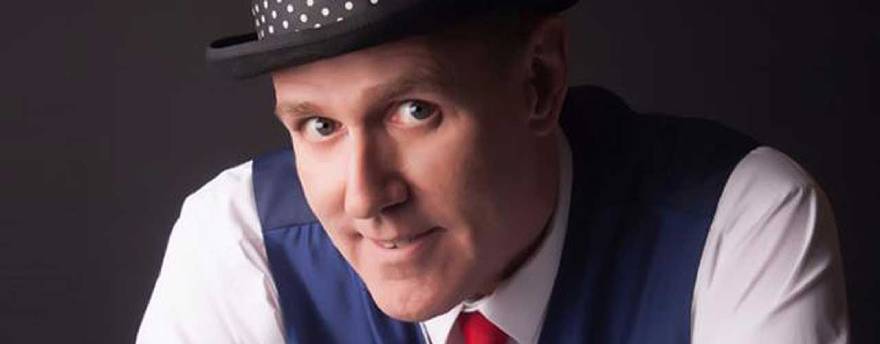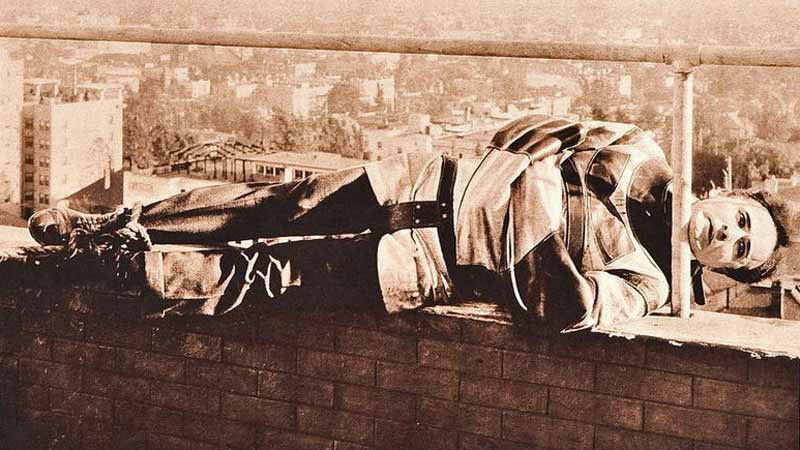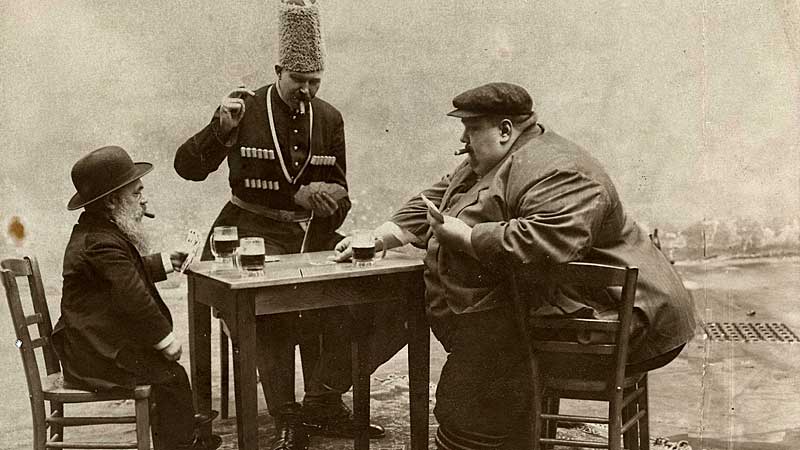Keith Fields' "Starting Over... in a New Country!" Podcast Interview
by Christian Painter and Roland Sarlot

What We'll Explore
After 30 years of success as a British magician, Keith Fields made the life-changing decision to move his family not only to the United States but to the tough and gritty home of Motown... Detroit, Michigan. (What was he thinking!?!?!) In this interview, Keith shares his strategy on what areas of magic are fast to break into, how to differentiate yourself, taking chances, building relationships, and becoming a regular on local television.
Who is Keith Fields?
British magician, Keith Fields, won the international street performer of the year, the South England club Entertainer of the Year, and the Magic Circle close-up champion of the year. He was very successful as a professional magician in England but then made the life-changing decision to move to the United States and start all over again. Since his arrival in 2009, Keith has had a three-year run of his one-man show in Gatlinburg, Tennessee, been the staple of many magic conventions across the United States, a regular at the Magic Castle, and has a running dinner show with his wife in Detroit, Michigan.
Running Time:
The following interview has been edited and condensed for clarity.
What you can do
You are welcome to share up to 500 words of the below transcript in a non-commercial purpose provided you credit and link back to our site like this: "The Magic Oracle Business Podcast".
The Interview
Christian Painter: On this episode of the Magic Business Podcast...
Keith Fields: And there's that whole thing about show business is two words. That it's a cliche that we all know. But you know what the reality is? We don't know it because if we did know it, we'd all be making a lot more money.
Christian Painter: Welcome to the Magic Business Podcast, where we share insightful and delightful inner secrets about the business of magic. This is where magic professionals are going to share their real-life experiences and some of their most guarded secrets to help further your career in the magical arts. I am your host Christian Painter, in partnership with the MagicOracle.Club, where you can hear all of our magical business podcasts.
Keith Fields is originally from the United Kingdom. He now lives in Detroit, Michigan. While in the UK he won the international street performer of the year, the South England club Entertainer of the Year, and the Magic Circle close-up champion of the year. He was very successful as a professional magician in England. But then he decided to move to the United States and start all over again. Since his arrival in 2009 has had a three-year run of his one-man show in Gatlinburg, Tennessee. He has been the staple of many magic conventions across the United States, a regular at the Magic Castle, and has a running dinner show in Detroit, Michigan, along with his charming wife, Lady Sarah.
Welcome to the show, Keith.
Keith Fields: Thank you very much indeed, Christian, it's lovely to talk to you.
Christian Painter: I am looking forward to this interview because you're going to tell us about starting from zero. But to understand that people need to know that you were very successful in England. Is that correct?
Keith Fields: Well, that is true. There's not much I hadn't done in a 30-year performing career back in the UK. And by not much, I've done everything from comedy clubs, corporate shows, cruises, TV shows, TV warmups, trade shows. On a quiet week I was doing maybe five to seven comedy club gigs a week. So I was a busy jobbing, hard-working comedian, with a magician, with some, you know, really nice jobs going on.
Christian Painter: So most magicians would be thrilled to be that successful. But you said, "Now that's not good enough. I'm going to move to the United States and start all over again."
Keith Fields: Yeah.
Christian Painter: So, the first question people are going to ask is, "Why did you move to the United States?"
Keith Fields: The opportunity came up and Sarah and me said, "Why not?" And my kids were 11, 12, and 14 at the time said, 'Why not?" So we came to America. We did it legally. We got the paperwork and everything, but it very much was something we did on a whim. But from my point of view, I didn't want to spend the next 15 or 20 years of my working life doing exactly the same as I had been doing for the last 10 or 15 years. However successful it was, I just wanted to do something new.
Christian Painter: Understood. Okay. So, now you've moved to America. And correct me if I'm wrong, but you have no contacts here. It's not like you were coming here because somebody wants you to do a show or had work for you.
Keith Fields: No, I didn't have any contacts for shows. I did have a family here though, my brother lived here. So I did have a base, which is why we ended up coming to Detroit rather than one of the entertainment centers of the world like Vegas, or LA or something like that, which would probably have been well, I don't know, if it had been easier, it would have definitely been different. But seeing as we had a family connection, we thought it was good to come over and spend some time with family.
Christian Painter: Okay, so now we're getting to the meat because you are now here, and you are starting with zero.
Keith Fields: Absolutely.
Christian Painter: How do you do that?
Keith Fields: Well, you say starting with zero. The reality was, I was starting with 30 years of experience. So I wasn't actually starting with zero. But if you imagine someone comes out of the blue and turns up at the Magic Castle and goes, "I'm a brilliant magician, I want you to book me," you know, they'd go, "No, that's not how it works." And that's the same with virtually every entertainment venue, with comedy clubs over here. You can't just walk in and get work. You have to sort of earn the right to do those jobs. But I didn't, say, come with nothing, because I came with all this experience. And I came with a lot of business knowledge as well. And there's that whole thing about show business is two words. You know, there's the show, and there's the business. And it's a cliche that we all know, but you know what the reality is? We don't know it because if we did know it, we'd all be making a lot more money. So, we need to actually get down to it and say, "It's the business side which is where the money is made." And I'd go as far as saying, "It's always the best salespeople which make the most money." And I'm guessing that would be your experience as well over here as it was for us back in the UK. So, you know, you have a choice. Do you want to be the best salesperson or do you to be the best magician? Because, in one sense, you can't be both.
But you need to make a living. And I had an approach where I had two priorities. And the first priority was I needed to make a living. So I had to look at what I was, with no contacts, no nothing. So I had to start from scratch. So my thoughts about starting from scratch are quite obvious when you think about it.
Firstly, you have to know yourself, know what you're good at and start playing to your strengths. And after that, you have to know what markets you can work in, what markets are available to you to earn money. And now I think as magicians, there's a number of very clear markets we have, we have the kids market, where we're talking about birthdays and schools. There's the close-up market, which is everything from restaurants, private parties, trade shows, corporate events, that kind of thing. There's the stand-up market, which goes from street shows, fairs, and festivals, cabaret, comedy clubs, dinner theater, private events, small corporate events. And then we get larger, again, to theater shows, and then larger, again, to the sort of speaker type large corporate gigs. That's where we can go. Now, each one of those markets works in a different way. And if we want to work in one of those markets, you have to have a very deep understanding of what they actually mean. What I mean by that is understand that there's a pipeline in all of these markets. And how long does it take before you get an inquiry? And how long does it take to turn that inquiry into a gig, and turn that gig into money? If you're talking corporate events, the lead time, assuming you're established and they know who you are, the lead time is three or four months. And I needed to sort of start earning money more quickly than that because I had arrived in a foreign country with a family and no income. So the corporate stuff wasn't where I could start. So I had to look at markets that I could start more quickly. But knowing what the markets were, breaking them down, and having a logical approach, and working out which markets I wanted to work in was sort of the first way that I started.
Christian Painter: Okay, so what was the first market that you decided to attack?
Keith Fields: Ah, well, that was an easy one, really, because I wanted to do two things. I wanted to start performing because I basically ended up having a couple of months off when we sort of moved over here, and I needed to start performing. So I needed to start earning money as well. So I wanted to do something tomorrow. I didn't want to sort of spend the next two or three months working on advertising and marketing. So I did exactly what I did when I first started 30 years ago, and I became a street entertainer. And I went up to a place called Frankenmunth in Michigan, which is a bit of a sort of touristy town, and I just approached the local Chamber of Commerce, and said can I do some street shows? They said, yes, you can do it here. Fine. I went out and I started doing street shows. And at the end of my first show, which was great fun, it was nice to be on the street again, a guy came up to me and he gave me his card. He said, "Will you give me a call tomorrow?" And it turns out that he was one of the biggest agents in the Midwest.
Christian Painter: That is serendipitous, right there.
Keith Fields: I would love it if that was a true story. But that's not how the way the world works.
Christian Painter: Okay, you caught me.
Keith Fields: But then I did the street shows, and that's what I started doing because I needed to be working. And that was a thing from me inside. I needed to be working, I needed to be earning money. And I started doing street shows and I started looking at every single market I could. I did a few children's birthday parties, I very quickly decided that I didn't want to go back down that route again because they're quite hard work. I started approaching comedy clubs, and I discovered they were really hard to get into over here. And it really was all about making contacts. And luckily, I had Lady Sarah, my fantastic wife was behind me all the way and she got on board as well. And we were working together on just meeting people and letting people know we were here because that's the first thing. No one's going to book us if they don't know we exist. And you have to somehow make headway and make a noise and make your presence known. And it was very difficult. After about four or five months, I did have an, "Oh crap, what have I done?" moment. When I thought I've moved my family to a foreign country, which is what this is, or it was at the time, and I just literally almost thought I don't know what to do. But we sat down and we came up with a logical approach to say, "Okay, we've got to market ourselves, we've got to push ourselves out there." So we just started finding any way we could go out and be in front of people. One of the things we did was we joined the local chambers of commerce and all that kind of thing. And they have business referral groups. We joined all those and we went out and I was speaking on communication skills and entertainment. And just putting our face out there as much as possible. And it was a long, hard slog.
Christian Painter: Now I want to put the magnifying glass on what you're saying right here. Because I think a lot of entertainers don't understand the power of getting out and talking with people, especially influencer groups, or people like you're talking about as opposed to most people, I think, "I got my website out and I'm just waiting," as if that website is this bait that everyone's going after. And I've now heard this, from many people we've interviewed is, how hard they work at going outside your comfort zone and talking, you know, like you just said, going to all these groups and putting yourself in front of people, so people know you exist.
Keith Fields: Yeah, absolutely. It is hard. It's not, if it was easy, everyone would do it, and everyone would be more successful. And at the end of the day, it's something that you really have to work at. And you talk about websites, I mean, one of the things that surprise me is how old most people's websites are. It's like, "Have you got a website?" "Yes, I've got a website. I've had one for 10 years." And, you know, the internet has moved on an awful lot in 10 years. And you can look at some people's websites, and it looks like it was done 10 years ago, and that was it.
Christian Painter: So what was the thing that gave you your first traction where you said, "Alright, we're starting to make headway?"
Keith Fields: I think actually the first traction I made, which was, it was a great relief, was actually in the magic world. And it was something I'd never really done before. I'd never sort of pushed myself into the sort of lecturing circuit. But it was Denny Haney who… I was doing a show somewhere, I can't even remember where it was but I was in Vegas and I went into his magic store in Vegas. And all of a sudden, the guy who worked there said, You've got to speak to Denny, he's a huge fan of yours. And I'm going, "I've never met Denny Haney. How can he be a huge fan of mine?" Turns out that I had. I did this book test about 15 years ago called Insight, actually, probably about 20 years ago now. And Denny was a huge fan of this book test. I had never met the guy but five minutes later I was on the phone with him and he was booking me for a lecture. And I didn't have a lecture. But I didn't have any work. So I said, "Yes." And I came home. And the first thing I had to do then was write a lecture. And I did a lecture at Denny's. And one thing led to another and all of a sudden, I found I was working on the lecture circuit.
Christian Painter: Well, and for those years, I remember, there was hardly a convention that I would read about that you were not a part of in some way.
Keith Fields: Yeah, I was kind of like the new kid on the block for a little bit. Which was, I suppose, they said, there's no such thing as an overnight success. You know, I had 30 years of experience. And people used to say, you know, "Where on earth do you come from?" And I thought, well, I've just moved here, you know.
Christian Painter: The magic circuit is a short-term fun circuit.
Keith Fields: Absolutely. Very much so. And it's something that has a shelf life unless you're the sort of person who is creating new magic and going out selling new magic all the time and that's what you do. And I didn't want to do that. I wanted to be an entertainer. I wanted to go out and do shows, that's where my heart is.
Christian Painter: Well, then, what was the next thing that got you doing that?
Keith Fields: The next thing that got me going was, we started pushing ourselves out further into, and we discovered things like the GigMasters and GigSalads were just coming out at the time. And again, a lot of people were being very critical of these things, saying, "Oh, it's just about, you know, getting the cheapest possible gig and all that kind of thing. And it's like bidding down prices." And we heard all this. And I just thought, well, it may be, but if everyone's saying it's awful, let's at least find out for ourselves rather than believing everybody else. And you know what, if you systematically use these things, they're actually very effective. And we started getting corporate bookings. So we aimed our GigSalads and GigMasters pages to corporate booking and made it look very corporate. We worked hard to get reviews because that was, again, a very important thing on those sites. The more reviews you get, the better you look. So you always follow up. Don't just take the gig, follow up, get the reviews, and it just picks up.
Christian Painter: So, now we had a little run with the magic market. We've got the ball rolling now with some of those online things. What's next?
Keith Fields: The next thing really is just putting ourselves out there and meeting more and more people. Because I mean, the way the one-man show came about was, literally I just met someone who started doing a show and he said, "There's space in the theater for another show if you want to come down, I'll introduce you to the guy." And that was kind of just how it happened. It was just a casual meeting. I think it was Tiger Woods who said… no, no, it was Magic Johnson. He said, "The more shots I make, and the more I practice, and the more I work, the luckier I get.” And I think that's kind of true for our game as well. The more you actually put yourself out there, the more these chance meetings will happen and something will lead from it. So it's statistics, really, the more people you meet, the more chance there is to meet someone that's going to be positive and have a good effect on your life. So that was one of those chance meetings and like one of my favorite life sayings is, "The answer's yes, what is the question?"
Christian Painter: And I want to point out that for a lot of people who want to open their one-man show, it's not like you didn’t already have years of material, correct?
Keith Fields: Oh, yeah. Yeah, absolutely. It really is. I couldn't stress how important it was to actually be really creative and have something really original. If you're going to do something like a one-man show, you can't afford to just go up there and do sort of standard magic. People won't talk about that. You need to have something different.
Christian Painter: And I'm looking as I know, somewhat of your career, that one-man show in Gatlinburg was a turning point for you, was it not?
Keith Fields: Absolutely huge turning points because it opened my eyes up to there was so much more that I could be. I think, actually, I'd been in this business a long time before I decided I was an artist. That might sound weird. I always thought of myself is more of a craftsman, a jobbing magician, a journeyman magician who went out there and did a good job. Whereas it was during that time that I really discovered so much more about performing. It's kind of crazy. I'd been doing it for 25, 30 years before I really had this huge growth spurt. And I discovered that I really wanted to do theater shows.
Christian Painter: And then, and I know you've done some things in between that and now you've opened this Dinner Theater Show in Detroit. What happened in between these two?
Keith Fields: In between those two, basically, we just kept going and kept working. The corporate shows started to come in. And we started to break into more and more markets. I think it was continually the thing that came up, was people would always say when we did a show, "Why have we never heard of you before?" And that gave us the confidence to push ourselves out there so much more. We were obviously, to a certain degree, a breath of fresh air because we were different to what they'd been booking before. Being British helped that open doors. Having an accent, which apparently some people like.
Christian Painter: You can get away with murder with a British accent.
Keith Fields: Well, that was something which was a long learning curve for me as well. People used to say that to me all the time, but I didn't kind of believe them. And I didn't kind of get it. And it was partly the experimenting, doing the theater show for a long period of time that I've actually really begun to play on the British angle. The show was called A Brit of Magic. And this became a big thing and a big part of the show.
Christian Painter: Fantastic. Now, you're back. So now you've come back to Detroit. And you've started your show there, this Dinner Theater. Now, what made you decide to do that?
Keith Fields: This has on and off been a dream for a long time. To actually being in Gatlinburg gave us the ability to go, "Yes, it could really happen, we can make it happen." Every step of the way, it's just been a case of, "Okay, we'll do one show, and we'll see what happens." And it's all an experiment, you never know how it's going to pan out. But what's the worst thing that can happen? The worst thing that could happen is we put on the show, it didn't sell any tickets, had to cancel the show and lost a bit of money. Big deal. So knowing that we just put the show on, and we sold out our first show, and it was great fun, and we all loved it. And we said, "Shall we do it again?" And we went, "Alright, then we'll do it again." And it kind of started the ball rolling. But doing the first show started that ball rolling. And when we'd started it, the next one was easier. The next one was easier still. I think the most interesting thing about doing a regular show is after about two or three shows, you've used up all your friend base for selling tickets to. And you've used up your friends of friends. And it's when you get to about the third or the fourth event that you then have to say, "Actually, we have to find people. We don't know to sell tickets." And that's another big thing that you have to come to terms with. You've got to then think about marketing, how you get your name out there. And again, that's where all the work we've done over the years in the chamber of commerce, making sure that people locally knew who we were. We started marketing through those organizations to keep things going. So we were now getting first-timers in who hadn't seen this before rather than friends.
Christian Painter: You've been doing something that I thought, I think is very, very smart, which is you've made yourself kind of a staple of the TV show, or morning shows there in Detroit. And I know you're doing that to look ahead at when we get to open our show back up. Again, you've put yourself in front of people, you've made yourself known. Tell us about that concept.
Keith Fields: Okay, we worked out that back in March. The first couple of months, like everyone else, we sat here twiddling our fingers going, "What's happening?" And then we worked out there, it's gonna be a long haul. It was kind of like, "What can we do in this time?" So we contacted the local TV show, WXYZ TV, and they were struggling like crazy. They couldn't get guests on the show because they were in lockdown as well. So they were having real problems finding content for their morning magazine programs. Well, I looked at what they had and they were doing it on their iPhones. Everyone was thrown in at the deep end, you know. And you had reporters filming stuff on their iPhones and I thought, "Well, I've got an iPhone. That means I can film some stuff." So we filmed a little public information, The Comedy Public Information Film, which you can see on our YouTube channel if you just go to YouTube and search for Keith Fields. And I sent it to them. And the first one was about, I think, it was mask etiquette or something because masks were just coming in, on how to wear a mask. And it was just a few magic tricks and jokes about masks. And there was like a two-minute public information film with some good advice. And they just started taking these things. And we've had about two appearances every month since March, on the local TV channels.
Christian Painter: That was brilliant. So we'd like to end our interviews with this. And that is, we're hosted on the MagicOracle.Club. And, in this moment, you are the Magic Oracle. I'm sure many people have asked you, "Well, how did you start this? How did you come to America and start it over again?" And I'm sure you've answered that question many times. But what's the one question that people never seem to ask you but probably should?
Keith Fields: I suppose the question would be, "What was the most important ingredient that made this all work?" And I'm going to sound a little bit big-headed when I answer this question, so forgive me. But at the end of the day, it's all about the quality of the product. If you're selling a crap product, then you're going to have a much harder job than if you're selling a good product. And I think, you know, the bottom line was I arrived here with 30 years of experience. And I arrived here as a reasonably experienced performer. I had a lot to learn when I got here. I had to change things in all sorts of subtle ways. I had to Americanize my act. But we had a quality product to sell. So I would say to anyone, the most important thing is the quality of your product. And if you're selling a substandard product, you're not just damaging yourself and doing yourself no good, but you're damaging the whole market. You're damaging it for everyone else. So make sure we always spend some time concentrating on the product, or the quality of the act, of the performance that we're putting out there.
Christian Painter: That is fantastic advice. Keith, thank you so much for being on the podcast.
Keith Fields: It's been a pleasure.
Christian Painter: Thank you for listening to our Magic Business Podcast. Please visit the MagicOracle.Club where you can hear all of our magic business podcasts and enjoy a vast array of additional magical knowledge. Let us leave you with this thought from John Maxwell, "Life is a matter of choices and every choice you make, makes you." As always, we at the Magic Oracle wish you continued success on your path in the magical arts.
A Jolly Genie?

The Magic Oracle is a FREE site but I still must pay dastardly server fees! Please, donate ANY amount... $1, $5, $10, why not $1 million?
THANK YOU for keeping magic alive... and me, a Jolly Genie!



